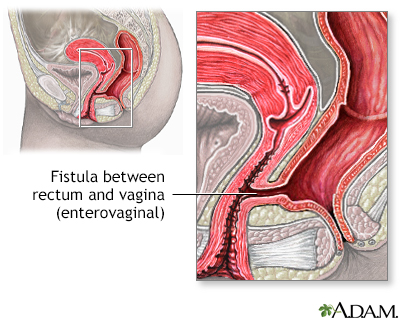
Entero-enteral fistula; Enterocutaneous fistula; Fistula - gastrointestinal; Crohn disease - fistula
A gastrointestinal fistula is an abnormal opening in the stomach or intestines that allows the contents to leak to another part of the body.


Most gastrointestinal fistulas occur after surgery. Other causes include:
Depending on where the leak is, these fistulas may cause diarrhea, and poor absorption of nutrients. Your body may not have as much water and fluids as it needs.
Tests may include:
Treatments may include:
Some fistulas close on their own after a few weeks to months.
The outlook depends on the person's overall health and how bad the fistula is. People who are otherwise healthy have a very good chance of recovery.
Fistulas may result in malnutrition and dehydration, depending on their location in the intestine. They may also cause skin problems and infection.
Contact your health care provider if you have:
De Prisco G, Celinski S, Spak CW. Abdominal abscesses and gastrointestinal fistulas. In: Feldman M, Friedman LS, Brandt LJ, eds. Sleisenger and Fordtran's Gastrointestinal and Liver Disease. 11th ed. Philadelphia, PA: Elsevier; 2021:chap 29.
Nussbaum MS, McFadden DW. Gastric, duodenal, and small intestinal fistulas. In: Yeo CJ, ed. Shackleford's Surgery of the Alimentary Tract. 8th ed. Philadelphia, PA: Elsevier; 2019:chap 76.
BACK TO TOPReview Date: 6/11/2024
Reviewed By: Jenifer K. Lehrer, MD, Department of Gastroenterology, Aria - Jefferson Health Torresdale, Jefferson Digestive Diseases Network, Philadelphia, PA. Review provided by VeriMed Healthcare Network. Also reviewed by David C. Dugdale, MD, Medical Director, Brenda Conaway, Editorial Director, and the A.D.A.M. Editorial team.

|
A.D.A.M., Inc. is accredited by URAC, also known as the American Accreditation HealthCare Commission (www.urac.org). URAC's accreditation program is an independent audit to verify that A.D.A.M. follows rigorous standards of quality and accountability. A.D.A.M. is among the first to achieve this important distinction for online health information and services. Learn more about A.D.A.M.'s editorial policy, editorial process and privacy policy. A.D.A.M. is also a founding member of Hi-Ethics and subscribes to the principles of the Health on the Net Foundation (www.hon.ch). |
The information provided herein should not be used during any medical emergency or for the diagnosis or treatment of any medical condition. A licensed medical professional should be consulted for diagnosis and treatment of any and all medical conditions. Call 911 for all medical emergencies. Links to other sites are provided for information only -- they do not constitute endorsements of those other sites. © 1997- A.D.A.M., Inc. Any duplication or distribution of the information contained herein is strictly prohibited.